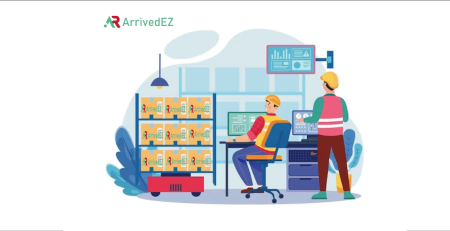Delivering Excellence: Unveiling Case Studies of Success in Medical Courier Services
Arrived EZ2024-01-27T19:40:11+00:00In the fast-paced world of healthcare, the efficient and secure transportation of medical specimens, equipment, and supplies is crucial. Medical courier services play a pivotal role in ensuring that healthcare providers can deliver timely and quality care to their patients. In this blog, we will explore real-life case studies that showcase the success stories of medical courier services, highlighting their impact on the healthcare industry.
Ensuring Timely Delivery of Critical Medical Samples:
In the realm of healthcare, the efficient and timely transport of medical samples is critical for accurate diagnostics and prompt treatment. Case Study A sheds light on a medical courier service that recognized this challenge and implemented innovative strategies to enhance the transportation of crucial medical samples to diagnostic laboratories.
Challenges Faced:
Before the implementation of the streamlined process, the medical courier service faced challenges associated with prolonged sample transit times. Delays in sample transportation could potentially compromise the integrity of specimens, leading to inaccurate test results and, consequently, delayed diagnoses and treatment plans.
Optimizing Routes:
Understanding the urgency of medical sample transportation, the courier service took a proactive approach to optimizing routes. By leveraging advanced route optimization software, the service could identify the most efficient paths for sample pickups and deliveries. This not only reduced the overall travel time but also minimized the risk of delays caused by traffic congestion or inefficient route planning.
Utilizing Advanced Tracking Systems:
Real-time tracking of medical samples became a cornerstone of the courier service’s strategy. The implementation of advanced tracking systems allowed both the courier service and the diagnostic laboratories to monitor the exact location and status of each sample throughout its journey. This increased visibility provided a proactive approach to identifying and resolving any potential issues that could lead to delays.

Adhering to Strict Timelines:
Recognizing the importance of time-sensitive medical samples, the courier service implemented stringent timelines for sample collection and delivery. Couriers were equipped with clear instructions and schedules, ensuring that samples reached their destination within specified timeframes. This commitment to punctuality not only instilled confidence in healthcare providers but also contributed to faster diagnoses and subsequent patient care.
Results and Impact:
As a result of these strategic initiatives, the medical courier service experienced a significant reduction in sample transit times. The streamlined process led to faster deliveries, enabling diagnostic laboratories to initiate testing promptly. This, in turn, contributed to quicker diagnoses and more timely treatment plans for patients. The positive impact on patient outcomes underscored the importance of efficient medical sample transportation in the overall healthcare ecosystem.
Case Study A demonstrates how a medical courier service, by addressing the challenge of rapid and precise medical sample transportation, can significantly contribute to improved patient outcomes. The combination of optimized routes, advanced tracking systems, and strict adherence to timelines showcases a proactive and innovative approach that aligns with the evolving needs of the healthcare industry.
Temperature-Sensitive Deliveries:
In the dynamic landscape of healthcare, maintaining the integrity of temperature-sensitive medical specimens and supplies is a paramount concern. Case Study B delves into a specialized medical courier service that recognizes the unique challenges associated with temperature-sensitive deliveries. By implementing cutting-edge temperature monitoring systems and specialized packaging, this courier service not only ensured the pristine condition of medications, organs for transplant, and other sensitive materials but also contributed to advancements in medical treatments.
Challenges Addressed:
Temperature-sensitive medical shipments face the risk of degradation and compromise if exposed to unfavourable conditions during transportation. Medications, tissues for transplant, and certain diagnostic specimens demand precise temperature control to guarantee their efficacy and suitability for medical use.
Implementing State-of-the-Art Temperature Monitoring Systems:
Recognizing the critical nature of temperature control, the courier service in Case Study B invested in state-of-the-art temperature monitoring systems. These systems provided real-time tracking and monitoring of the environmental conditions within transport vehicles, ensuring that the designated temperature range for each specific medical item was consistently maintained. Any deviations from the optimal conditions triggered immediate alerts, allowing for swift corrective actions.
Specialized Packaging Solutions:
To complement the advanced monitoring systems, the courier service employed specialized packaging solutions designed to insulate and protect temperature-sensitive medical shipments. These packaging solutions were tailored to the unique requirements of different medical materials, providing a barrier against external temperature fluctuations and physical shocks during transit. This meticulous approach significantly reduced the risk of temperature excursions and safeguarded the integrity of the transported items.
Ensuring Optimal Condition of Medications and Organs for Transplant:
The implementation of these advanced technologies and packaging strategies had a direct impact on the reliability of the courier service. Medications, including those requiring strict temperature control, arrived at their destination with their efficacy intact. Organs for transplant, a particularly time-sensitive and delicate category, reached transplant centres in optimal condition, increasing the likelihood of successful transplantation procedures.
Contributions to Medical Advancements:
Beyond ensuring the safe delivery of temperature-sensitive materials, Case Study B illustrates how the courier service’s commitment to precision had broader implications for medical advancements. Reliable transportation of research specimens, experimental medications, and organs for transplantation facilitated ongoing medical research and improved treatment options. This contributed to the overall progress in healthcare, underscoring the vital role of specialized medical courier services in advancing the frontiers of medicine.
Case Study B exemplifies how a medical courier service specializing in temperature-sensitive deliveries can go beyond ensuring the safe transportation of medical materials. By implementing advanced monitoring systems, specialized packaging solutions, and maintaining a commitment to precision, this courier service not only elevated its reliability but also played a crucial role in advancing medical treatments and research.

Meeting Regulatory Compliance:
In the realm of medical courier services, adherence to stringent regulatory requirements is not just a legal obligation but a cornerstone for ensuring patient safety and confidentiality. Case Study C delves into a medical courier service that recognized the complexity of compliance landscapes and proactively partnered with regulatory experts. Through the implementation of robust quality control measures, rigorous training programs, and unwavering commitment to industry standards, the service not only met regulatory requirements but also gained a competitive edge by demonstrating a profound commitment to patient safety and confidentiality.
Challenges in Regulatory Compliance:
The healthcare industry operates within a web of regulations aimed at safeguarding patient welfare, maintaining data confidentiality, and ensuring the integrity of medical specimens during transportation. Navigating these regulatory waters can be a challenging task for medical courier services, as non-compliance not only carries legal repercussions but also poses risks to patient care.
Strategic Partnership with Regulatory Experts:
Understanding the critical importance of regulatory compliance, the medical courier service in Case Study C opted for a strategic partnership with regulatory experts. These experts brought in-depth knowledge of evolving compliance requirements, helping the courier service stay abreast of changes in laws and regulations. This collaboration facilitated the development of proactive strategies to address emerging compliance challenges and ensured that the courier service operated within the bounds of legal and ethical standards.
Robust Quality Control Measures:
To meet and exceed regulatory standards, the courier service implemented robust quality control measures across its operations. This included meticulous checks and verifications at every stage of the transportation process, from sample collection to final delivery. By establishing a culture of quality assurance, the service not only minimized the risk of errors but also instilled confidence in healthcare providers and regulatory bodies regarding the reliability of its operations.

Rigorous Training Programs for Couriers:
Recognizing that the effectiveness of compliance measures depends on the actions of its personnel, the courier service instituted rigorous training programs for its couriers. These programs covered not only the technical aspects of sample handling but also emphasized the importance of patient confidentiality, ethical conduct, and compliance with privacy regulations. Couriers were equipped with the knowledge and skills necessary to handle sensitive medical materials with the utmost care and in full compliance with regulatory requirements.
Competitive Edge through Commitment to Patient Safety and Confidentiality:
By successfully navigating complex compliance landscapes, the medical courier service not only met regulatory requirements but also gained a competitive edge in the market. Healthcare providers, keen on ensuring the safety and confidentiality of patient information, were more inclined to partner with a courier service that demonstrated a commitment to these principles. This competitive advantage translated into strengthened partnerships, increased business opportunities, and enhanced credibility within the healthcare industry.
Case Study C showcases how a strategic approach to regulatory compliance can be a game-changer for medical courier services. By partnering with regulatory experts, implementing robust quality control measures, and prioritizing rigorous training programs, the service not only met legal obligations but also gained a competitive advantage by establishing itself as a reliable and ethical partner committed to patient safety and confidentiality. This case study underscores the importance of viewing regulatory compliance not just as a requirement but as a fundamental aspect of delivering high-quality healthcare services.
Customized Solutions for Healthcare Facilities:
In the intricate web of healthcare, each facility operates with unique demands and specifications. Case Study D explores how a forward-thinking medical courier service recognized the individuality of healthcare providers and established collaborative partnerships with a diverse range of facilities. By understanding and addressing the specific needs of each client, the courier service optimized its routes, delivery schedules, and communication channels, leading to enhanced efficiency and heightened client satisfaction.
Recognizing the Uniqueness of Healthcare Facilities:
Healthcare facilities, whether small clinics or large hospitals vary significantly in their operational requirements, patient demographics, and service offerings. A one-size-fits-all approach to medical courier services is often insufficient, necessitating a nuanced understanding of each facility’s distinct needs.
Collaborative Partnerships with Healthcare Providers:
The courier service in Case Study D adopted a collaborative approach, engaging closely with healthcare providers to comprehend the intricacies of their operations. This involved establishing open lines of communication, conducting thorough assessments of each facility’s requirements, and fostering partnerships based on transparency and trust. Such collaboration allowed the courier service to tailor its services to the unique demands of each healthcare facility.
Optimizing Routes for Efficient Deliveries:
Recognizing that efficient transportation is a critical factor in healthcare logistics, the courier service in Case Study D undertook a meticulous analysis of delivery routes. By understanding the geographical layout and specific demands of each healthcare provider, the service optimized its routes to minimize transit times, reduce costs, and ensure timely deliveries. This tailored approach not only improved overall efficiency but also contributed to the reliability of the courier service.
Customizing Delivery Schedules:
Different healthcare facilities often operate on distinct schedules, ranging from round-the-clock emergency services in hospitals to specific hours of operation in clinics. Case Study D showcases how the courier service adjusted its delivery schedules to align with the operational hours and peak times of each facility. This customization ensured that medical specimens and supplies were delivered precisely when needed, preventing disruptions to patient care and enhancing the overall effectiveness of healthcare operations.
Tailored Communication Channels:
Effective communication is paramount in healthcare logistics. The courier service in Case Study D recognized this and customized its communication channels to suit the preferences and protocols of each healthcare provider. This involved integrating with existing communication systems, providing real-time updates through preferred channels, and ensuring seamless coordination between the courier service and the healthcare facility. The result was enhanced transparency and responsiveness, contributing to a more streamlined and reliable courier service.
Results: Improved Efficiency and Client Satisfaction:
By adopting a tailored approach to medical courier services, Case Study D demonstrated a significant impact on efficiency and client satisfaction. The collaborative partnerships, optimized routes, customized delivery schedules, and tailored communication channels collectively contributed to a service that not only met but exceeded the unique expectations of each healthcare facility. This resulted in heightened client satisfaction, strengthened relationships, and a positive impact on the overall healthcare delivery system.

Case Study D exemplifies the importance of recognizing the uniqueness of healthcare facilities and tailoring medical courier services to meet individual needs. By fostering collaborative partnerships, optimizing routes, customizing delivery schedules, and adapting communication channels, the courier service showcased an innovative and flexible approach. This case study underscores the value of adaptability in healthcare logistics, where customized solutions contribute not only to improved efficiency but also to elevated client satisfaction and overall healthcare quality.
The success stories presented in these case studies underscore the vital role that medical courier services play in the healthcare ecosystem. By addressing challenges such as timely deliveries, temperature-sensitive shipments, regulatory compliance, and customization for different healthcare facilities, these services contribute significantly to the overall quality of patient care. As the healthcare industry continues to evolve, these case studies serve as a testament to the innovative solutions and dedication of medical courier services in supporting the seamless functioning of healthcare delivery systems.











Leave a Reply